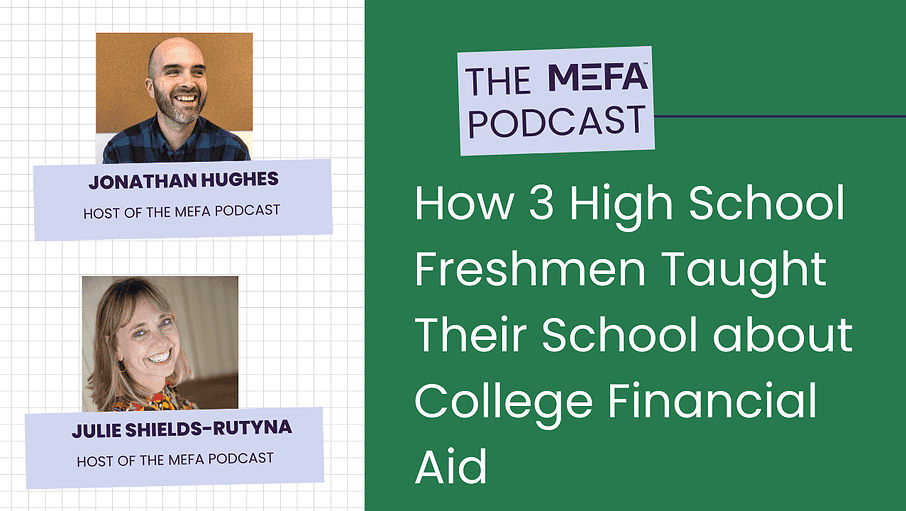

Resources Mentioned in this Episode
Jonathan Hughes: [00:00:00] Hi everyone and welcome to the MEFA Podcast. My name is Jonathan Hughes and today we have on our show an interview segment with three high school students, Tanmayee Kallouri, Laura Valentina da Silva and Ella Bailey. Now, I always like it when we can actually get to hear and bring you the voices of students directly.
And this week, we have these three students from King Phillip High School in Massachusetts. They’re part of an international business competition called DECA. And you’re going to hear about what that competition is like and why they decided as their topic to cover college loans and college financing.
And what they did to foster knowledge and understanding on that topic for themselves and for their fellow students and [00:01:00] those students parents. So without further delay, please enjoy my talk with these very impressive first year high school students and I’ll be back with you for the follow up.
Tanmayee Kollouri: My name is Tanmayee Kollouri, and I’m a freshman at King Philip High School.
Laura Da Silva: I’m Laura da Silva, also a freshman in King Philip High School.
Ella Bailey: I’m Ella Bailey, and I’m also a freshman in King Philip High School.
Jonathan Hughes: Thank you very much. And so together you are engaged in a project together. And can you tell folks what that is?
Ella Bailey: DECA is like an elective that you can choose in the beginning of the year, which it covers public speaking, professional dress and like how, and project management, and it just gets you ready for a business major in college.
Laura Da Silva: And DECA itself is directed towards entrepreneurship and it calls. Calls emerging leaders in college and high school communities.
Tanmayee Kollouri: So specifically in DECA we’re in the project management category which means that we pick a year [00:02:00] long project. And it’s because we’re in the project manage management category we use like project management tools in order to solve like a problem.
Jonathan Hughes: It’s is this a nationwide thing?
Tanmayee Kollouri: It’s an international thing.
Laura Da Silva: It’s an international thing.
Tanmayee Kollouri: Yeah. Each school does it differently. Like I know for example, Sharon has an after school club. We have it as a class, so it’s integrated into our schedule, just like any other math or English class. And then we have that class once a day.
And we do competitions. So we do three competitions. The first level of competition is districts where you compete with neighboring school districts. And then the second level of competition is states where you compete within statewide. So it’s like a little bit more farther away. And then the last level of competition is ICDC, which is international competition.
Jonathan Hughes: And you said that King Philip has is a heavy hitter as far as this is concerned, right? [00:03:00]
Tanmayee Kollouri: Yeah, we’re like the number one chapter in Massachusetts for the last 20 something years.
Jonathan Hughes: That’s a lot of pressure. And you’re all freshmen. Is that right? You said that? Yeah. Good luck with everything. How did you get interested in this type of thing? Since this is a class, is this something that every student takes?
Ella Bailey: No, you can choose if you want to take it or not, but with this project, specifically, I got interested when Tanmayee was telling me about it, and I knew that I was going to need this information further on in my life, like, when applying to college.
Jonathan Hughes: So let’s talk about that, then. What are you doing for your, concentration or project within DECA, this project management?
So we’re basically talking about student loan debt and the dangers of it. And incoming college students don’t really have the rudimentary knowledge needed to go into college and set up financial aids and [00:04:00] save for Like their student loans. So we’re trying to spread information about student loans.
Whose idea was it to focus on this part of it?
Ella Bailey: Tanmayee.
Laura Da Silva: Tanmayee.
Jonathan Hughes: And so what made you pick that Tanmayee?
Tanmayee Kollouri: So I think it, for me it started with my parents because my parents both grew up. And they both went to college there and college there is much, much cheaper. Like both of their education was finished with I think $20 to $30, 000 American dollars. And obviously now that I’m going into college and my parents have like 401ks and things like that. I think my dad started talking to me about it. I think when I was going into freshman year and he was like, for you, it’s going to be a lot more difficult to pay for college because.
We never had to deal with that. So I don’t know how the process here works. So we can’t offer you as much guidance as we would like. And he started like sending me all these links. And I think also my cousin is going to college right now. She’s a [00:05:00] sophomore at Northeastern, which is a private college.
She was talking to me about like, how expensive it is and how much student loans she had to take out. And I just think like all this overwhelmingness of it, I think, was what really got me interested into what can I do to make my life easier when I go into college?
Laura Da Silva: I basically got into this project that I wanted to continue because my cousin majored in marketing in college, and she was telling me all about how she would have loved to do DECA because it was a great, it would have been a great opportunity for her to jumpstart.
And me personally, I don’t really want to do marketing, but. I feel like it would be a good opportunity for me to do this for my resume and also my parents both own businesses of their own. And as I was picking my classes, I saw Deca and my mom brought it up to me and she was like, it’s a great way to solve a problem.
Ella Bailey: And I feel like you would [00:06:00] succeed a lot in this category. And then, My dad, he was The one that got me interested, he owns a store and. Boston, I think, and he’s taking a class similar to DECA on Tuesday nights. And both my parents grew up in Brazil, and then when they came back, they couldn’t really afford college. And they’re, like not pressuring encouraging me to go to college so that I can further my education. Tell me what this what you’re actually doing as part of your project now about you said that the focus of it was student debt and paying for college and what tell me what everything that you’ve done.
Tanmayee Kollouri: So I think we’ve had three main events that we’ve done. So I we can each explain one. Our first event was our school’s open house. So that was like early October 5th. And that was when our project was just getting started. So we hadn’t had any like concrete plans on what we wanted to do.
Everything was just in like the planning phase. And [00:07:00] we like set up a table and we made flyers so that everyone like could follow our Instagram, like more updates, whatever. And I think it was like a couple of parents that came up to me and Ella. And like Laura was like handing out flyers and then they came up to me and they were like, Oh, do you, are you guys hosting a meeting after school one day because we want our kids to go.
And I think that’s where we got the idea that like a lot of parents are actually interested in this kind of information. And like the school obviously does have like informational nights and things like that for senior parents, but it’s a lot of parents want to get a head start on it. They want to be like better prepared for it. So they were like, if you guys plan an after school thing, I think that would be really beneficial.
So throughout the school year, we did, I think three in person seminars to Mr. Swansburg account, Mr. Swansburg accounting class. And Mr. Swansburg is like a teacher that has some classes about accounting and financial literacy. And then we presented to a class of sophomores, a class of seniors and a class of [00:08:00] freshmen, and then we posted pre surveys and post surveys to like, see what they knew before and after, and they like, really got the information they needed.
Jonathan Hughes: And what was the information? Where did you get the presentation from?
Tanmayee Kollouri: So we made the presentation ourself with the help of my cousin. It was like eight slides and it kind of just took like a It was like an overload of information basically put into like easy words to understand. So we had basic information on what’s the difference between a private loan and a federal loan.
What are the difference between unsubsidized loans and subsidized loans? What is the current debt crisis like in the United States? So just a lot of information that wasn’t like, we weren’t like telling people what to do because obviously we’re not educated on that. We haven’t studied that we’re not professionals, but we’ve just took a lot of data and research that we’ve done, and then we just put it into slides and presented it to them.
Jonathan Hughes: Okay.
Tanmayee Kollouri: And then we [00:09:00] also hosted a financial literacy night. And Beth Keenan came in and she, yeah, she did a presentation. We had a goal of around 20 people to come in and take notes and just listen to the presentation, gain knowledge. But we exceeded that and there was over 85 people that came and the library was filled and we’re just super happy.
Ella Bailey: And basically Beth Keenan came in and she talked about how to set up financial aid, unsubsidized versus subsidized loans federal versus private loans. All the information and we saw so many parents writing down notes and just listening and it was a huge opportunity because all the parents that came in we’re going to have children that were going into college or their children are [00:10:00] already in college or they have like debts that they still have to pay off.
Jonathan Hughes: Sometimes all three probably. I was going to ask you, do you know the parents were the parents of, was it seniors primarily? Or was it the earlier grades?
Tanmayee Kollouri: It was like primarily upper classmen. There were some freshmen and sophomore parents, but it was like, cause at the beginning, Mrs. Keenan took like a vote.
Laura Da Silva: She was like, how many senior parents are here? How many juniors? And I think there was like 90 percent junior and senior parents. And then like a little bit of freshman and sophomore now.
Jonathan Hughes: Do I understand too is there, did that lead to any further plans?
Tanmayee Kollouri: Yeah. In the attendance that night was also the head of our guidance department, Jessica Nutter. And after the presentation ended, she was super impressed with us. And she came up to us and Mrs. Keenan, and she talked about the possibility of Mrs. Keenan coming into our school again in January or February. To talk to seniors now, like now that you’ve gotten [00:11:00] into college, what are the next steps you can take? And then they also mentioned hosting one with parents of seniors. So it’s like how to pay for the college bill now that you’ve gotten.
Jonathan Hughes: And so if I can ask you based on all the things that you’ve done I imagine you learned. Financial aid and paying for college and all that stuff. And if you could talk about whatever that was. And then also, what do you think most kids don’t know and should know?
Tanmayee Kollouri: Personally, the biggest thing I like learned is that There’s so many ways you can actually reduce your student loan debt that a lot of people aren’t aware of. Like, when I was doing research, I learned that you could take some of your classes through community classes in high school, and that reduces the amount of credits you have to take for college. Which thereby reduces your college expenses by a lot, because each class in college is like $200-$400 or something for each credit. So when you’re reducing the amount of credits, you’re, like, [00:12:00] indirectly reducing your amount of cost for college.
Jonathan Hughes: So what is next? For you, for the project,
Tanmayee Kollouri: I think even before financial aid, like the other night happens, we have districts coming up soon. So it’s January 5th. So currently we’re like, learning our script for our presentation. And I think we’re really focusing on that right now, because it’s so soon. And I think after districts, we’ll have a lot more time and we’ll, I’m going to reach out to Miss Nutter again, see what’s happening in the guidance department, see if like they need our help anyhow. And I think, and, after districts states is only like a month after that. So we have a busy schedule.
Jonathan Hughes: I can only imagine. I could not have done anything like this when I was a freshman in high school. So congratulations to you. You’re all very poised and accomplished at such a young age, but do you know what you might want to do when you’re out of high school and you’re out of college or you might want to study in [00:13:00] college and then, and do ultimately is it have your own business or?
Ella Bailey: My mom has always wanted me to have my own business where I get older, but that’s not really the route I want to take. I want to go to medical school when I get older and become a surgeon. So this isn’t really like the department that I’m willing to work with when I’m older, but I think it’s a great opportunity to do DECA right now because it’s very, it’s fun.
Laura Da Silva: Can I ask What gave you the idea of being a surgeon?
Ella Bailey: I think I just have watched like a lot of Grey’s Anatomy, I’ve watched a lot of Grey’s Anatomy and I can really just picture myself like being there and it’s been like a dream for me ever since I was like. Eight years.
Jonathan Hughes: Okay. Laura?
Laura Da Silva: I mainly started DECA because I wanted to learn more about the business side of it because when I graduate college or during college, I want to take a marketing major because my dad and my aunt, they [00:14:00] work together and do something similar and it intrigues me. And then just doing DECA can prepare myself, pay better for college and be more educated on the topic. I think for me, I want to go into finance. So that’s something that really interests me for a while. I did consider medical too, but my cousin is a business analytic major. So I like sit with her while she’s doing some of her finances.
And I think for me, that’s just so interesting. And I love the stock market. Like this is something that surprises a lot of people, but it’s I love the stock market. I have a lot of stocks currently. I love investing. So it’s just, for me, it’s something that’s it’s super interesting. And it’s just that’s something I really want to pursue in the future. So I think my, like my dream career would be like a hedge fund manager or something like that.
Jonathan Hughes: Any colleges on the, like any dream colleges on the radar?
Tanmayee Kollouri: Yeah, so I think UPenn would be my first one, like Wharton would [00:15:00] obviously, like that would be my dream school. And then I think U. Michigan is one that I’m really going for as well.
Jonathan Hughes: Good luck with everything. And I hope you continue on. I hope you continue on the tradition. Congratulations and good luck with everything.
Tanmayee Kollouri: Thank you so much.
Jonathan Hughes: Alright, I want to thank Tanmayee, Laura, and Ella for being on our show and sharing their knowledge with us. Good luck to them. And folks, if you liked what you heard today and you want to know more about planning, saving, and paying for college and career readiness, then please follow the show. And you can do that wherever you get your podcasts.
And also please, if you’re so inclined, leave a review for the show. It just helps us to keep doing what we’re doing and bringing this content to folks. Just like you. Special thanks to our producers Shaun Connolly, AJ Yee and Lisa Rooney for their assistance in getting the show [00:16:00] posted. Once again, my name is Jonathan Hughes and this has been the MEFA Podcast. Thank you.













